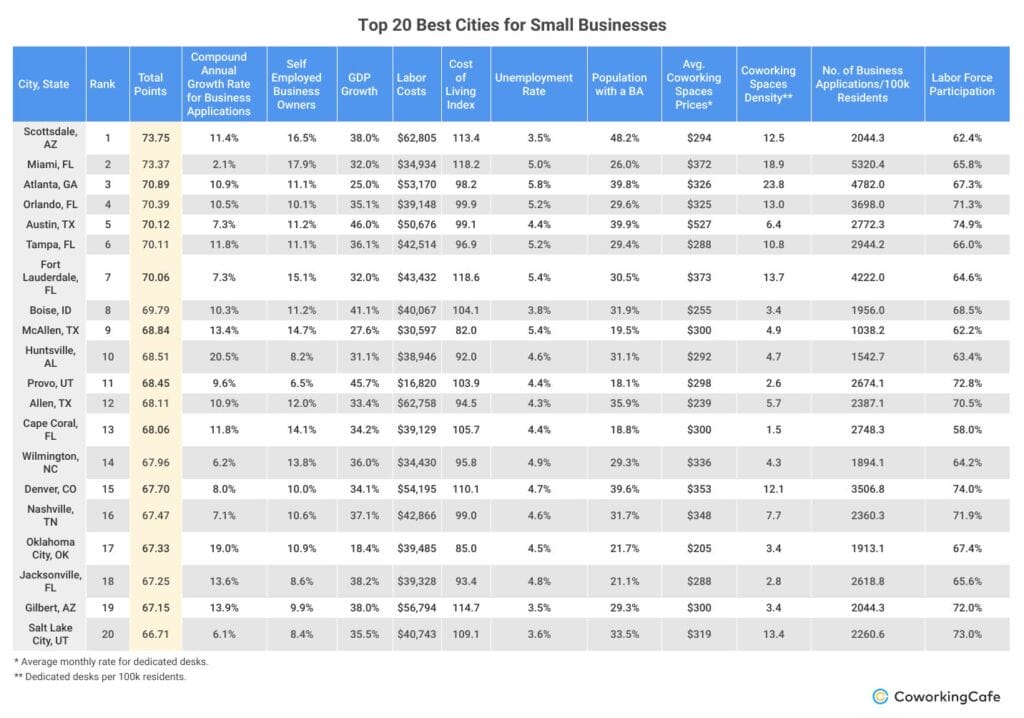Starting a small business and eventually making it big has long been synonymous with the American Dream. In fact, in 2018-2019, 62% of adults viewed entrepreneurship as a promising career path. Fast forward to 2023 and this belief has translated into action for many with a record-breaking 5.5 million new business applications filed across the country. But, let’s face it, starting a small business is no small feat, and finding just the right spot to set up shop can make all the difference. But, many wonder: What are the best cities for small businesses in the U.S.?
MORE NEWS: Scottsdale ranks among 5 best cities for working parents
With this in mind, we set out to find the top U.S. cities where aspiring business owners can thrive in 2024. To do so, we analyzed 136 cities across various key metrics, including gross domestic product (GDP), number of business applications, labor costs and more. And two Metro Phoenix cities — Scottsdale and Gilbert — rank in the Top 20.
Here is what stood out for Scottsdale and Gilbert:
Scottsdale: Ranked No. 1
- Percentage of self-employed business owners: 16.50%, ranking 2nd
- Unemployment rate: 3.5%, ranking 5th
- Percentage of population with a BA: 48.2%, ranking 5th
- GDP growth: 38%, ranking 5th
- Coworking spaces density: 12.5 per 100k residents, ranking 8th
Gilbert: Ranked No. 19
- Unemployment rate: 3.5%, ranking 5th
- GDP growth: 38%, ranking 5th
- Labor force: 72%, ranking 11th
- Growth rate for business applications: 13.9%, ranking 15th
Southern Comfort for Entrepreneurs: 14 of the Top 20 Cities for Small Businesses are Below the Sun Belt
When it comes to the best cities for small businesses, the South clearly stands out. With 14 of the top 20 cities hailing from below the Mason-Dixon line, places like Miami, Orlando, FL, and Austin are sizzling hot for startups.
Meanwhile, out West, cities like Denver and Salt Lake City are making a strong case for small business success, and it’s no surprise that the top small business hotspot also comes from this region.

Top 5 cities for small businesses
1. Scottsdale, AZ – 73.75 points
The city’s GDP skyrocketed between 2018 and 2022 by 38%, signaling a strong and expanding economy in the area. Scottsdale, AZ, has been recognized in the past as one of the fastest-growing startup cities in the U.S. and it continues to keep its status in 2024, leading the pack of cities for small businesses.
Additionally, more than 16% of business owners are self-employed — the second-highest share in the nation, just behind Miami. Of course, the city’s strategic location near Phoenix, combined with its low disaster risk and excellent infrastructure, makes it an attractive place for both new and established businesses to thrive.
2. Miami – 73.37 points
Business is booming in Miami, which ranks second on our list. The city paves the way in the number of business applications per 100,000 residents with an impressive 5,320. As a result, self-employment is highly prevalent in the area with close to 18% of its workforce owning businesses.
The cost of living index of 118.2 puts living expenses in Miami at over 18% higher than the national average. Despite this higher cost, the relatively low labor costs of $34,934 make it financially easier for entrepreneurs to operate their businesses. This combination allows them to invest more in their ventures and seek out new opportunities, making Miami an appealing place for business despite the overall higher living expenses. Furthermore, its low corporate tax rate — combined with a strong GDP growth of 32% — makes Miami a top spot for startups in sectors like finance, tech, and logistics.
3. Atlanta – 70.89 points
Sitting at #3 in our ranking, Atlanta isn’t just a hub for southern hospitality—it’s also a powerhouse for small businesses, boasting a coworking space density of 23.8 per 100,000 residents — the highest in the nation. Notably, coworking spaces are a game-changer for small startups, offering cost-effective, flexible work environments that can easily scale up or down as business needs evolve. This allows entrepreneurs to focus on growth without the pressure of long-term leases and overhead costs.
Moreover, the city’s workforce is highly educated, with nearly 40% holding a bachelor’s degree, and its labor costs (though higher at $53,170) support a diverse economy that spans technology, media and logistics. At the same time, the city’s GDP growth rate of 25% and a low unemployment rate of 5.8% make it a prime spot for entrepreneurs looking to capitalize on a booming market.
4. Orlando, FL – 70.39 points
Orlando’s business scene is as eclectic as its theme parks, with a business application rate of 3,698 per 100,000 residents — the fourth-highest in the nation. At the same time, the city’s cost of living is moderate at 99.9, and its labor sits at $39,148. Orlando’s focus on tech and creative industries, along with a strong GDP growth rate of 35%, makes it a booming ground for new ventures, which only strengthens its position as a top city for small businesses.
5. Austin, TX – 70.12 points
Austin’s reputation as the “Silicon Hills” is well-deserved, given that the city has the eight-strongest business application rate of 2,772 per 100.000 residents. What's more, Austin’s workforce is highly educated, with nearly 40% of its population holding a bachelor’s degree. Granted, labor costs are relatively high at $50,676, but the city makes up for it with a low unemployment rate of 4.4% and the highest GDP growth rate nationwide - of 46% - making it an ideal place for both startups and small businesses to thrive.




